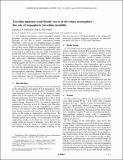Traveling planetary-scale Rossby waves in the winter stratosphere: The role of tropospheric baroclinic instability
Author(s)
Domeisen, Daniela I. V.; Plumb, R. Alan
DownloadPlumb_Traveling planetary.pdf (516.4Kb)
PUBLISHER_POLICY
Publisher Policy
Article is made available in accordance with the publisher's policy and may be subject to US copyright law. Please refer to the publisher's site for terms of use.
Terms of use
Metadata
Show full item recordAbstract
The Southern Hemisphere winter stratosphere exhibits prominent traveling planetary-scale Rossby waves, which generally are not able to induce Stratospheric Sudden Warmings. A series of runs of a simplified general circulation model is presented, aimed at better understanding the generation of these waves. While the generation of planetary-scale traveling waves through the interaction of synoptic-scale waves is observed in a control run, when the model is truncated to permit only waves with zonal wave number 1 or 2, the long waves are found to increase in strength, leading to a considerably more active stratosphere including Sudden Warmings comparable in strength to Northern Hemisphere winter. This finding suggests that the role of tropospheric synoptic eddies is two-fold: while generating a weak planetary-scale wave flux into the stratosphere, their main effect is to suppress baroclinic instability of planetary-scale waves by stabilizing the tropospheric mean state.
Date issued
2012-10Department
Massachusetts Institute of Technology. Department of Earth, Atmospheric, and Planetary SciencesJournal
Geophysical Research Letters
Publisher
American Geophysical Union
Citation
Domeisen, Daniela I. V., and R. Alan Plumb. “Traveling Planetary-Scale Rossby Waves in the Winter Stratosphere: The Role of Tropospheric Baroclinic Instability.” Geophys. Res. Lett. 39, no. 20 (October 28, 2012): n/a–n/a.
Version: Final published version
ISSN
00948276